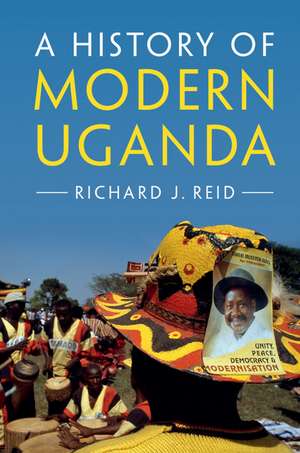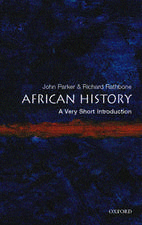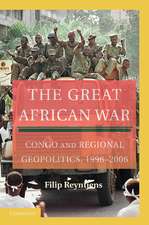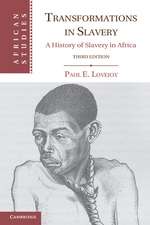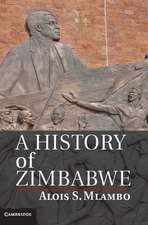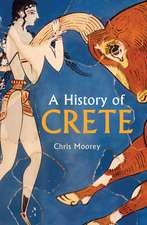A History of Modern Uganda
Autor Richard J. Reiden Limba Engleză Paperback – 16 feb 2017
| Toate formatele și edițiile | Preț | Express |
|---|---|---|
| Paperback (1) | 201.08 lei 3-5 săpt. | |
| Cambridge University Press – 16 feb 2017 | 201.08 lei 3-5 săpt. | |
| Hardback (1) | 672.65 lei 6-8 săpt. | |
| Cambridge University Press – mar 2017 | 672.65 lei 6-8 săpt. |
Preț: 201.08 lei
Nou
Puncte Express: 302
Preț estimativ în valută:
38.48€ • 40.19$ • 31.91£
38.48€ • 40.19$ • 31.91£
Carte disponibilă
Livrare economică 21 ianuarie-04 februarie 25
Preluare comenzi: 021 569.72.76
Specificații
ISBN-13: 9781107671126
ISBN-10: 1107671124
Pagini: 428
Ilustrații: 8 maps
Dimensiuni: 152 x 228 x 24 mm
Greutate: 0.57 kg
Editura: Cambridge University Press
Colecția Cambridge University Press
Locul publicării:New York, United States
ISBN-10: 1107671124
Pagini: 428
Ilustrații: 8 maps
Dimensiuni: 152 x 228 x 24 mm
Greutate: 0.57 kg
Editura: Cambridge University Press
Colecția Cambridge University Press
Locul publicării:New York, United States
Cuprins
Explanations, apologies and acknowledgements; List of maps; Prologue: a view from the museum; 1. Refractions: beholding Uganda; 2. Pensive nation: the age of blood and rebirth; 3. Rukidi's children: the trials and tribulations of Kabalega and Mwanga; 4. The adventures of Zigeye and Atuk: the age of opportunity and disparity; 5. Kings and others: history and modernity; Epilogue: managing time and space; Sources and bibliography; Index.
Recenzii
'An exceptional book, which seeks to restore the nation as a focus of historical enquiry in Africa. Reid reframes Uganda's history, moving away from standard narratives of ethnic and sectarian division, and identifying alternative unifying themes - the political creativity, and inequity, stimulated by violence; migration as a source of uneasy integration at best, deepening chauvinism at worst; and the enduring significance of the precolonial period. This reflective, erudite study sheds new light on the uneven creation of a nation, formed through the organic, internal, autogenerative processes of political and social affiliation, as much as the externally-imposed architecture of borders and flags.' Shane Doyle, Director of the Leeds University Centre for African Studies (LUCAS)
'From Kintu the first man on earth and founder of the Buganda kingdom to Kiprotich the 2012 Olympic marathon winner, Reid constantly confronts past and present with a fine disregard for chronology to prove that a national history is possible for even the most divided of nations. Product of an unequal political geography centuries old and of a botched British decolonisation, ruined times over by military adventurers since, Uganda is nonetheless tied together by lively cultures of personal ambition, networks of social mobility, and artistic creativity. This is a tour de force, based as much on sharp-eyed fieldwork as on archival and bibliographic mastery.' John Lonsdale, Centre of African Studies, University of Cambridge
'A History of Modern Uganda elegantly offers both a much needed overview of Uganda's history that is grounded in its deeper past and shows the ways that history reverberates into the present. By consistently and very effectively pulling the north and east into dialogue with the south and west, Reid powerfully makes the case for a national history that predates the Uganda Agreement of 1900, all while demonstrating the transformative nature of the twentieth century.' Rhiannon Stephens, Columbia University, New York
'From Kintu the first man on earth and founder of the Buganda kingdom to Kiprotich the 2012 Olympic marathon winner, Reid constantly confronts past and present with a fine disregard for chronology to prove that a national history is possible for even the most divided of nations. Product of an unequal political geography centuries old and of a botched British decolonisation, ruined times over by military adventurers since, Uganda is nonetheless tied together by lively cultures of personal ambition, networks of social mobility, and artistic creativity. This is a tour de force, based as much on sharp-eyed fieldwork as on archival and bibliographic mastery.' John Lonsdale, Centre of African Studies, University of Cambridge
'A History of Modern Uganda elegantly offers both a much needed overview of Uganda's history that is grounded in its deeper past and shows the ways that history reverberates into the present. By consistently and very effectively pulling the north and east into dialogue with the south and west, Reid powerfully makes the case for a national history that predates the Uganda Agreement of 1900, all while demonstrating the transformative nature of the twentieth century.' Rhiannon Stephens, Columbia University, New York
Notă biografică
Descriere
A comprehensive history of Uganda, examining its political, economic and social development from its precolonial origins to the present day.
